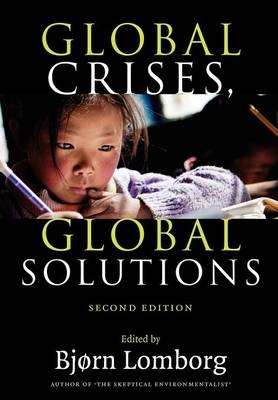
Global Crises, Global Solutions
Cambridge University Press (Verlag)
978-0-521-74122-4 (ISBN)
The first edition of Global Crises, Global Solutions was nominated as one of the books of the year by The Economist in 2004. This second edition asks: if we had more money to spend to help the world's poorest people, where could we spend it most effectively? Using a common framework of cost-benefit analysis a team of leading economists, including five Nobel prize winners, assess the attractiveness of a wide range of policy options for combating ten of the world's biggest problems: Air pollution, Conflicts, Diseases, Education, Global Warming, Malnutrition and Hunger, Sanitation and Clean Water, Subsidies and Trade Barriers, Terrorism, Women and Development. The arguments are clearly presented and fully referenced so that readers are encouraged to make their own evaluation of the menu of policy options on offer. Whether you agree or disagree with the economists' conclusions, there is a wealth of data and ideas to discuss and debate.
Bjørn Lomborg is Director of the Copenhagen Consensus Center and Adjunct Professor in the Department of Management, Politics and Philosophy at Copenhagen Business School. He is the author of the controversial bestseller, The Skeptical Environmentalist (Cambridge University Press, 2001), and was named as one of the most globally influential people by Time magazine in 2004.
Introduction Bjørn Lomborg; Part I. The Challenges: 1. Air pollution Bjørn Larsen, Guy Hutton and Neha Khanna; 1.1. Alternative perspective Jitendra Shah; 2. Conflicts - the security challenges in conflict prone countries Paul Collier, Lisa Chauvet and Haavard Hegre; 2.1. Alternative perspective Ibrahim A. Elbadawi; 2.2. Alternative perspective Andrew Mack; 3. Diseases - disease control Dean T. Jamison, Prabhat Jha and David Bloom; 3.1. Alternative perspective David Canning; 3.2. Alternative perspective Ramanan Laxminarayan; 4. Education Peter F. Orazem, Paul Glewwe and Harry Patrinos; 4.1. Alternative perspective Victor Lavy; 4.2. Alternative perspective Lant Pritchett; 5. Global warming Gary W. Yohe, Richard G. Richels, Richard S. J. Tol and Geoffrey J. Blanford; 5.1. Alternative perspective Chris Green; 5.2. Alternative perspective Anil Markandya; 6. Malnutrition and hunger Sue Horton, Harald Alderman and Juan A. Rivera; 6.1. Alternative perspective Reynaldo Martorell; 6.2. Alternative perspective Anil B. Deolalikar; 7. Sanitation and water Dale Whittington, W. Michael Hannemann, Claudia Sadoff and Marc Jeuland; 7.1. Alternative perspective Jenna Davis; 7.2. Alternative perspective Frank Rijsberman and Alix Peterson Zwane; 8. Subsidies and trade barriers Kym Anderson and L. Alan Winters; 8.1. Alternative perspective Alan V. Deardorff; 8.2. Alternative perspective Anthony J. Venables; 9. Terrorism Todd Sandler, Daniel G. Arce and Walter Enders; 9.1. Alternative perspective S. Brock Blomberg; 9.2. Alternative perspective Michael D. Intriligator; 10. Women and development Elizabeth M. King, Stephan Klasen and Maria Porter; 10.1. Alternative perspective Lawrence Haddad; 10.2. Alternative perspective Aysit Tansel; Part II. Ranking the Opportunities: Jagdish Bhagwati, François Bourguigno, Finn E. Kydland, Robert Mundell, Douglass North, Thomas Schelling, Vernon L. Smith and Nancy Stokey; Expert panel.
| Erscheint lt. Verlag | 9.7.2009 |
|---|---|
| Zusatzinfo | 148 Tables, unspecified; 2 Halftones, unspecified |
| Verlagsort | Cambridge |
| Sprache | englisch |
| Maße | 173 x 246 mm |
| Gewicht | 1360 g |
| Themenwelt | Sozialwissenschaften ► Soziologie |
| Wirtschaft ► Betriebswirtschaft / Management ► Marketing / Vertrieb | |
| Wirtschaft ► Volkswirtschaftslehre ► Finanzwissenschaft | |
| Wirtschaft ► Volkswirtschaftslehre ► Wirtschaftspolitik | |
| ISBN-10 | 0-521-74122-X / 052174122X |
| ISBN-13 | 978-0-521-74122-4 / 9780521741224 |
| Zustand | Neuware |
| Haben Sie eine Frage zum Produkt? |
aus dem Bereich


